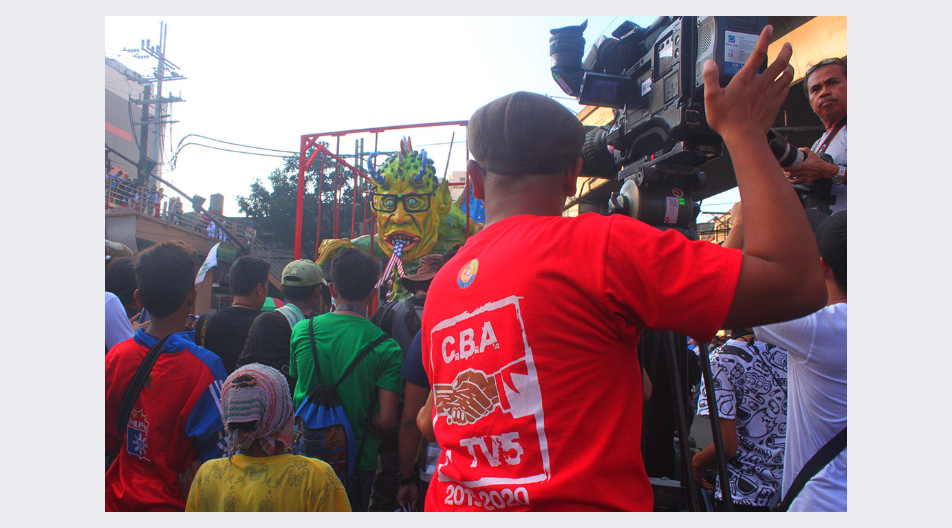Submitted to the Senate Committees on Labor, Employment and Human Resources Development and on Public Information and Mass Media
—
The National Union of Journalists of the Philippines welcomes discussion on proposals to secure better pay and working conditions for media workers.
While no journalist goes into this profession with illusions of wealth and comfort, the public service nature of media work should not mean free or poorly-compensated labor and taking unnecessary risks.
Mandatory written contracts
While the particulars for mandatory written contracts prior to commencement of work are clear, we suggest that contracts for freelancers, correspondents and for those in similar work arrangements to include compensation that includes the cost of doing the assignment as well as insurance coverage for the time that the assignment is being carried out.
Minimum wage
NUJP welcomes the reiteration in the proposed bills that media workers should receive at least the prevailing minimum wage as necessary because this is not often the case for colleagues.
A small survey by NUJP of more than 200 colleagues in March 2021 showed that 44% of respondents received monthly compensation of P15,000 and below. Fifteen percent said that they were paid P5,000 or less.
Seven out of ten media workers in the survey said they have had to take on other jobs or engage in small businesses to get by.
We also welcome mentions in the bills to the right to self-organization and collective bargaining.
The Department of Labor and Employment in July reiterated that bipartite mechanisms such as collective bargaining “are still the best and most efficient way of increasing wages above the minimum wage levels.”
Media workers need an environment where they can freely organize for collective bargaining and redress to be able to do that.
Overtime, night differential pay
We also welcome the call for overtime and night shift differential pay for media workers as the practice of working overtime for free is common and has been passed off as part of the “culture” of newsrooms.
We hold that while journalism is at times a calling and vocation, it is also work and that employers cannot expect their workers to do it for free.
Security of tenure
We support as well the proposal to ensure regularization of a media worker “after six months of continuous employment, regardless of the nature of employment” as well as the proposal to count cumulative engagement towards the computation of employment.
We recognize that freelancing and project-based employment are a trend in media in the Philippines and abroad. We hope, however, that freelancers who do want and who qualify for security of tenure are given an opportunity to get it.
We are wary of the argument that employing media workers on a project or “raket” basis is necessarily beneficial to these media workers because of higher pay.
NUJP holds that media workers might not have to take on several “rakets” if a single job can provide them with the proper compensation and benefits that they deserve and need.
We recognize that freelancing and “raket” work are valid work options and should remain options and not a necessity for workers who are having trouble making ends meet.
Hazard pay and insurance
NUJP welcomes the proposal to mandate hazard pay of at least P500 per day – 25% of their daily rate in some proposals – for media workers who are covering war zones and conflict- and calamity-affected areas.
In the same 2021 NUJP survey, half of respondents said they were not given hazard pay when assigned to risky coverage and the proposal will hopefully address that lack.
We welcome as well the proposal for employers to provide their media workers with safety gear when assigned to potentially hazardous coverage.
During the pandemic, colleagues had to rely on the kindness of other media workers to secure personal protective equipment.
This, despite being acknowledged as front-liners and as essential personnel. We agree that the safety of media workers should be included in newsroom budgets and protocols.
We welcome as well the proposals for mandatory additional insurance for media workers apart from the Social Security System/Government Service Insurance System, PhilHealth and Pag-IBIG.
News Media Tripartite Council
The creation of a News Media Tripartite Council is among the proposals contained in the Philippine Plan of Action on the Safety of Journalists, which stakeholders developed and launched in 2019.
While the various groups that worked on the PPASJ have been working – individually and sometimes in collaboration – to operationalize the plan, a directive for DOLE to “initiate the creation of a [council] which shall serve as a link among various stakeholders, provide a platform where news media workers and employers can agree upon mutually beneficial policies that will promote the interests of the media industry, and serve as an avenue to express their aspirations, discuss their programs or settle conflicts” is welcome and may be what is needed to get set that part of the action plan in motion.
Liability of media entities
While we agree that newsrooms should support their staff who are facing suits, representatives of media groups we have consulted with – including the Photojournalists’ Center of the Philippines, the Center for Community Journalism and Development and the Peace and Conflict Journalism Network – have raised concerns on how this provision might be used against smaller, community and alternative newsrooms.
We agree in principle that media workers should not be left to fend for themselves and that media entities should have oversight on and accountability for contributors and blocktimers, but are also wary that the liability may add to a chilling effect on critical views and reports.

